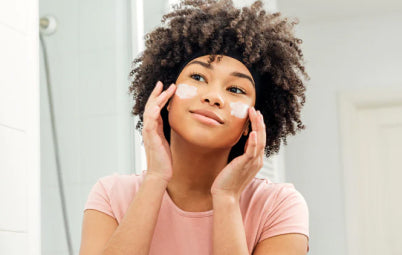Hyperpigmentation, the name for dark spots on the skin, is a common skin condition. In fact, up to 40% of us will experience it at some point. And while it’s completely harmless, many of us just don’t like the look of these dark spots and patches. Luckily, there are skincare ingredients out there which can lighten the look of hyperpigmentation, and one of them is hydroquinone.
While extremely effective, hydroquinone is something of a controversial ingredient, so it can be hard to know if it’s for you or not. At Face Dr, our team of skin experts know a thing or two about the latest and greatest ingredients out there, so to help, we’ve rounded up everything you need to know about this dark spot-fighting ingredient.
Want to save time and get an expert opinion on whether hydroquinone—or any other ingredient—is for you? We offer free online skincare consultations with one of our skin experts. They’ll be able to analyse your skin, ask about your concerns and then recommend the very best ingredients out there to help. Plus, they can recommend the best products that contain them, too.

Here’s what we’ll cover about hydroquinone:
- What does hydroquinone do for the skin?
- What is hydroquinone
- How does hydroquinone work?
- How do you use hydroquinone?
- Is hydroquinone right for me?
- What are the side effects of hydroquinone?
We’ve also covered other common skincare ingredients like Matrixyl 3000, lactic acid and bakuchiol.
What does hydroquinone do for the skin?
Hydroquinone works to lighten the look of hyperpigmentation on the skin. This means it:
- Reduces the look of dark spots
- Lightens discoloured patches
- Evens out skin tone
- Reduces the look of scarring from acne, eczema and psoriasis
What is hydroquinone?
Before we dive into how it works, what exactly is this lightning ingredient? Hydroquinone was discovered in the 1800s and is found in the leaves of plants like bearberries and whortleberries. It was used for decades to develop photos and, for the last 50 or so years, has grown in popularity in the skincare market as one of the best ways to treat hyperpigmentation.
However, it’s not without controversy. Hydroquinone is actually banned in places like the E.U. and Australia. In the U.K., you can’t buy hydroquinone products over the counter, but it is approved for use when prescribed by a skincare professional.
You can find hydroquinone in everything from creams to cleansers, but serums are most popular. It’s used to lighten the look of all types of hyperpigmentation, including sunspots, melasma and post-inflammatory hyperpigmentation.

How does hydroquinone work?
Hydroquinone is absorbed deep into the skin and blocks the enzymes that produce melanin. Melanin is the pigment responsible for the colour of our skin, so when our skin makes a lot of melanin in one place, it shows up as dark spots and patches on the surface.
Hydroquinone blocks and slows down the production of melanin, so existing dark spots fade, and new ones don’t pop up. This process can take as little as a few weeks, but for most people, they need to use a hydroquinone product for two to three months to really see the difference.
How do you use hydroquinone?
Interested in what hydroquinone could do for your hyperpigmentation? First, you’ll need to speak with a skincare professional to see if it’s right for you and get a prescription.
Next, most experts recommend doing a patch test to make sure your skin won’t react. To do this, you can simply swipe a small amount of the product on a discrete patch of skin, like the inside of your wrist, and wait 24 to 48 hours before checking for any redness or irritation.
How often you use hydroquinone depends on the strength of the product. Some products can be used daily or twice a day, so can be added to your usual skincare routine like you would a typical serum; others may be used only twice or three times a week.

Is hydroquinone right for me?
If natural products haven’t done the job and you’re experiencing stubborn dark spots that don’t seem to budge, it may be time to consider hydroquinone.
Though it’s not safe to use while pregnant or breastfeeding, it is safe for most other people. Although most skin types can use hydroquinone, those with dry or sensitive skin may experience some irritation so should patch test before using. Normal and oily skin types usually handle the ingredient better.
What’s more, it’s useful to think about your Fitzpatrick skin type when considering hydroquinone. On the Fitzpatrick scale, skin types are divided into 6 types. Fitzpatrick types 1 and 2 have fair skin that burns and freckles easily, types 3 and 4 have medium to olive skin that can burn but also tans easily, and types 5 and 6 have darker skin tones that don’t burn as easily.
When it comes to hydroquinone, the ingredient works better on people with Fitzpatrick skin types 1 and 2, or those with fairer skin. Though darker skin tones could see some benefits from using it, there is an increased risk of causing more discolouration, especially for Fitzpatrick skin types 5 and 6, so, as always, it’s best to speak with a professional before getting started.
What are the side effects of hydroquinone?
As with any skincare ingredient, there are side effects in some people. The most common are irritation, itching, stinging or redness, so it’s always important to patch test before applying directly to the face. You may even find that your skin is sensitive the first time you use it, but it gets used to it after a few uses.
While most people can use hydroquinone without any side effects, the ingredient does come with some risks. It’s been banned from over-the-counter products in the U.K. and other countries around the world, as using it incorrectly could lead to some more serious side effects.
As the product is a skin lightener, it’s recommended to use it only on dark spots and discoloured patches, as sometimes it can lighten skin around these areas as well.
In rare cases, hydroquinone can lead to a skin disorder called exogenous ochronosis, which makes the skin produce more melanin, making the problem worse. This is usually in cases where the ingredient was used for a long period of time or was a high concentration.
There are also some studies that found that it could cause cancer in animal tests. Many experts believe the results aren’t strong enough to prove this, and there’s no evidence to prove this could affect humans, too.
Want an expert opinion?

Curious about what hydroquinone can do for you, but not sure where to start? Book a free online skincare consultation with one of our skin experts. They can analyse your skin and give you tailored advice on if hydroquinone could help with your hyperpigmentation.
Plus, our team at Face Dr can also answer any other skincare questions you may have and recommend alternatives if hydroquinone isn’t for you, so you can brighten those dark spots once and for all. Worried about the risks? Our experts can also recommend some other lower-risk options that can help with hyperpigmentation, too.











